Roopkund Trek is now arguably one of the most popular treks in India because of its natural surroundings and astounding beauty.
Roopkund trek takes you to Roopkund Lake which is approximately 7 feet deep surrounded by snow-clad mountains, rock-strewn glacier and is frozen for the most part of the year.
The beautiful and unique landscapes are almost picture perfect and make it a sought after trekking spot in India.
Table of Contents:
Why is the Roopkund Trek considered the most popular trek in India?
Roopkund trek has got everything going for it. This trek is like a roller coaster which cuts across dense forests with oak trees, gurgling streams, awesome campsites, green pastures, alpine meadows, and snowfields.
It offers mesmerizing views of snow-capped peaks of the Himalayas and you can get close to Trishul (7120 meters) and Nandaghunti (6310 meters) during Roopkund trek.
How do I get to Roopkund Trek?
Roopkund trek starts from Lohajung ( 213 km from Kathgodam ) in Uttarakhand and follows the trail from Didina, Tolpani, Ali Bugyal, Bedni Bugyal, Patar Nachauni, Bhagwabasa, Kalu Vinayak Shrine and ultimately reaching to Roopkund Lake.
What is the best time for Roopkund trek?
The best time or season for Roopkund trek is from May to June (before the monsoons) or from August to October (after the monsoon). At both the season, you can experience different beauties of this trek that will simply blow your mind. You need a permit from the forest department to go to Roopkund Lake.
How is the Roopkund trek from May to June?
During this period the last leg of the 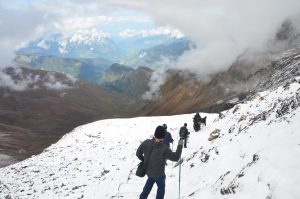
How is the Roopkund trek in July?
This is the peak monsoon season and these regions 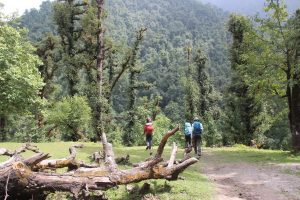
How is the Roopkund trek in August – September?
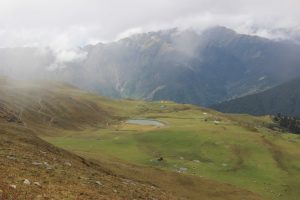
Roopkund becomes an easy trek during these two months of August-September and lack of oxygen at high altitude is the only challenge which trekkers will face.
How is the Roopkund trek in October?
During October month it starts to snow in this region. 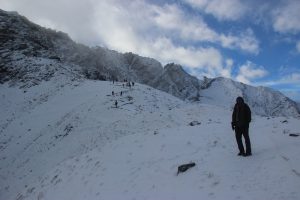
What are the things to carry on Roopkund Trek if you are planning to do independently?
Tent, Sleeping bag, Mat, ice-ax, crampons & ropes (depending upon season)
Ration: Vegetables, Rice, Salt, Tea Premix, pulses, Oil, Maggie, Biscuits, Snacks, Chocolates, Dry fruits, Glucose, Multivitamins and other food supplements.
Vegetables are available at Wan/Lohajung and kerosene, oil, stove, etc can be purchased or rented as well from these places.
Trekking accessories like sleeping bags, tents, ice-ax, crampons, ropes and even shoes are also available on rent from Wan or Lohajung. But preferably get your own trekking shoes and sleeping bags as they may not be of good quality
What is the typical Itinerary for Roopkund Trek?
People mainly use two routes for Roopkund Trek.
- The first route begins at Didna
- The second route begins at Lohajung.
Regardless of the route you choose, you will get plenty of help from the locals as well as guides.
What is the First route and Itinerary?
Wan-Bedni Bugyal – Patal Nachauni- Kalu Vinayak- Bhagwabasa (1 km) – Roopkund Lake.
No. of Days: 4 days & 3 nights
Route: Wan-Bedni Bugyal (12 km)- Patal Nachauni (5 km)- Kalu Vinayak (3 km)- Bhagwabasa (1 km)- Roopkund Lake (4 km).
Itinerary: For the first night, you will be staying in Bedni Bugyal and next overnight stay option can be Patal Nachauni or Bhagwabasa depending upon the availability of green huts, weather, endurance level. After doing Roopkund, next night can be spent at Patal Nachauni or Bedni Bugyal and then you can descend down to Wan next morning.
What is the Second route and Itinerary?
Lohajung – Didina – Ali bugyal – Bedni Bugyal – Patal Nachauni – Kalu Vinayak – Bhagwabasa – Roopkund Lake.
No. of days: 6 days, 5 nights
Route: Lohajung – Didina – Ali bugyal – Bedni Bugyal – Patal Nachauni – Kalu Vinayak – Bhagwabasa – Roopkund Lake.
Itinerary: On this route, you will be spending the first night at Didina and then follow the schedule mentioned for Route one. If you are descending down to Lohajung then this route will add 2 extra days and nights.
Many trekkers do it in a circle such as Lohajung – Didina – Ali bugyal – Bedni Bugyal – Patal Nachauni – Kalu Vinayak – Bhagwabasa – Roopkund Lake and while coming back return to Bedni and then to Wan.
What is the number of days required for Roopkund Trek?
It largely depends on the season when you are trekking and also depend on your starting point.
How to arrange for accommodation and food during the Roopkund Trek?
Independent trekkers have to carry their own ration and eatables. There is a basic lodge at Wan (200 INR per night) and few guest houses in Lohajung who also serve food for you on request. There are a few restaurants as well at Wan and Lohajung.
While you are trekking you can either pitch your own tents or stay in Fiber huts (approx 300 INR per night). Fiber huts are available on the trail at Bedni Bugyal, Patal nachni and beyond.
Is Roopkund Trek doable without a Trek organizer?
Yes, Roopkund trek can be done solo without a trek organizer. You get guides, porters, mules, trekking gears, ration and every other essential once you reach Wan or Lohajung. You can arrange everything after arriving at these base locations and negotiate with them. Refer to this Roopkund Trekking Guide.
Make sure that you are physically fit to undertake this trek because of the high deal of intensity and few steep climbs involved in the entire trek.
What is the mystery of the Roopkund Skeleton Lake?
Rookund Lake is also known as the mystery skeleton lake or ‘Lake of Skeletons’ because of the discovery of a pile of skeletons at an altitude of 5029 meters above sea level. These pile of skeletons are located at its periphery and are clearly visible when the snow melts during summer. It is a matter of bewilderment since it was discovered by a forest ranger in 1942 and there are various mythologies and proposed stories surrounding their presence at such a high altitude.
According to the legends, the skeletons are of a Kannauj King of 9th century AD who came for a pilgrimage of Mount Nanda Devi with his queen and other pilgrims. During their pilgrimage, there was an unexpected hailstorm and apparently, they got drowned in this lake.
Is the Roopkund Trek banned?
The high court ban (dated 28th August 2018) on camping in Uttarakhand meadows has affected this trek. Many organizers have stopped organizing this trek because of the ban.
Actually, as per the high court order, camping in the meadows is banned but the trek itself is NOT banned.
The local guides have found a workaround for this ban and do take trekkers to this beautiful trek by avoiding camping in the meadows.
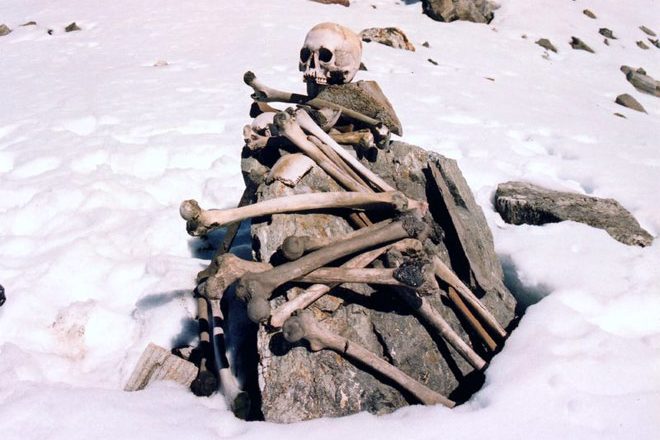
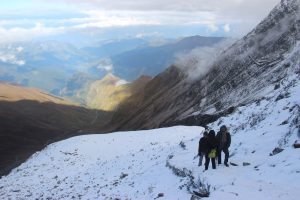
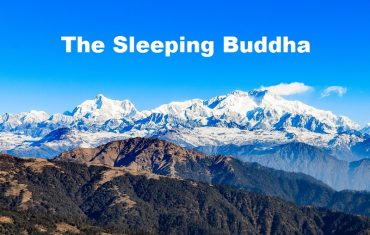
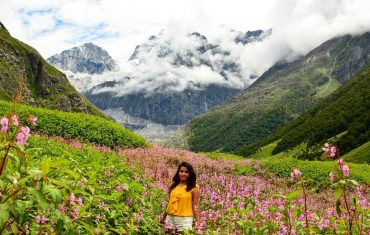
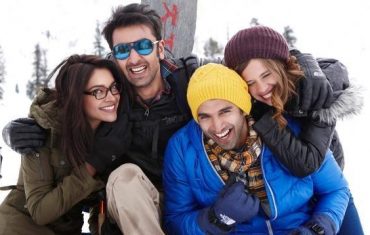
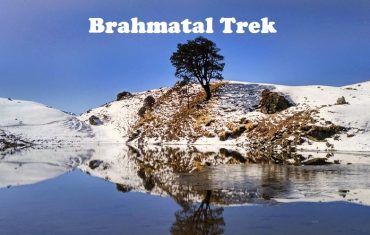
 WhatsApp Us
WhatsApp Us